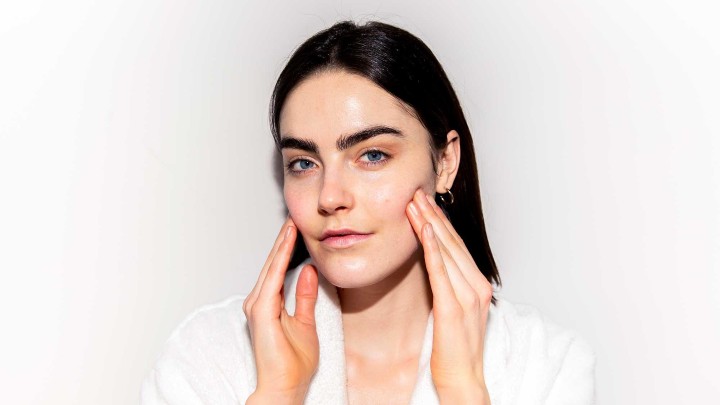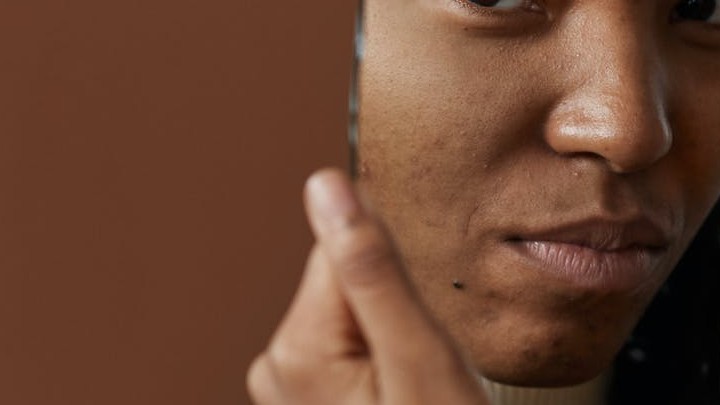Moisturizers provide your skin with essential nutrients to aid the renewing of your skin cells, giving your skin a smooth and soft texture.
So, to answer the question, do moisturizers cause acne? No, they don’t.
To help you know how moisturizing skincare products work, the right way to use them, and how to avoid acne, here is an overview of all you need to know about moisturizers and the causes of acne.
What are moisturizers?
Moisturizers are products you use to prevent dryness.
Moisturizers come in different varieties; you have lip moisturizers, hair moisturizers, face moisturizers, and body moisturizers. All of these work to give your skin cells moisture.
However, the main focus of this article is on face and body moisturizers. These moisturizers are oil- or water-based and contain other moisturizing ingredients. They treat skin dryness and prevent it from getting dry and scaly.
Moisturizers achieve this by retaining water in the outermost layer of your skin, called the stratum corneum. When the outermost layer of your skin has enough water, it stays hydrated, preventing it from tearing, and developing skin irritations like acne.
Do moisturizers cause acne?
The question of whether moisturizers cause the skin to develop acne is a common one. Although moisturizers are oil- and water-based, they do not cause acne. However, excessive use of moisturizers can cause your skin to have acne breakouts.
It would help if you had moisturizers to prevent your skin from having breakouts. If your skin is having acne from using moisturizers, it’s a sign that you are using too much moisturizer or you are using a moisturizer bad for your skin type.
Over-moisturizing your skin causes excess oil, which settles on your skin, doing nothing for it. Since the excess oil has no function, it becomes too much for the skin to handle, which causes it to develop into acne, whiteheads, rash, and other skin breakouts.
What causes acne on the skin?
Excess oil on your skin
When your skin is over-moisturized, your skin becomes more oily than it initially was. The excess oil on your skin attracts dirt, leaving your skin open to germs which causes your skin to get irritations and acne.
Moreover, the sebum production in your skin heightens, causing your skin to develop acne and more whites heads than you would like.
Sebum is simply the waxy and oily substance generated by your body’s sebaceous glands. The substance is a mixture of wax, sugar, acids, and other natural compounds in your body. Sebum builds a protective layer on your skin that prevents water from drying up.
Clogged skin pores
Experiencing clogged pores is a major sign that you are over-moisturizing. The oil, which was not absorbed from your skin, causes your skin pores to fill up with unnecessary oil, blocking it from retaining its needed essentials.
Clogged pores prevent your skin from shedding dead skin cells and drawing moisture from the air. Thereby causing your skin to develop acne and other skin irritations.
Tight skin
It is good for your skin to be tight but not when it includes your skin pores. Your skin is likely to look more wrinkled and have acne.
Tight skin, is a result of loss of collagen production, which provides elasticity to your skin. Collagen allows your skin pores to open, receive more moisture, and prevent acne.
It also allows your skin to stretch without having stretch marks. If your skin feels tight, you are prone to acne and stretch marks.
Dry skin
Having dry skin can cause acne too. This is because dry skin is without moisture, and your skin needs moisture to stay acne-free.
Moisturizers help keep dry skin moisturized. However, your skin can get dry from using moisturizers in excess.
When you over-moisturize your skin, it leaves out excess oil, which automatically causes a reduction in the production of natural oil in your skin.
Eventually, your skin will dry out because no matter the products you use to give oil to your skin, it still needs its natural oil to stay hydrated and healthy.
Moisturizer gone bad
Using expired moisturizers or moisturizers mixed with external ingredients to moisturize your skin causes acne. Expired and compromised ingredients cannot work well on your skin.
There are ingredients in some moisturizing products that only function within a certain period and in their pure form. When the period maxes out, or their pure form is altered, using the moisturizer on your body and face can damage your skin.
Using bad moisturizers on your skin is bound to cause skin reactions like acne, rashes, and an uneven skin tone.
Moisturizer used on the wrong skin type
Apart from over-moisturizing, using a moisturizer not suitable for your skin type can cause your skin to get acne and other skin irritations.
To get the best out of a moisturizer, you need to consider your skin type before using one.
Moisturizers to use to avoid acne
As stated above, your skin type matters in choosing a moisturizer to use. Consequently, your skin can develop acne in no time using a moisturizer that does not blend with your skin type.
Moisturizers have their ingredients when combined to make up a moisturizing product. These ingredients are divided into three categories.
- Occlusives: These ingredients work to provide your skin with a protective layer to prevent the loss of moisture. These ingredients include Silicones, petroleum jelly, beeswax, and petrolatum.
- Emollients: They are fatty acid ingredients such as cocoa butter, lanolin, collagen, shea butter, mineral oil, and jojoba oil among others.
These ingredients help to enhance the texture of your skin by filling in your crevices, making it look smoother and less wrinkled. - Humectants: These are acids such as glycerin, alpha hydroxy acid, lactic acid, and hyaluronic acid. These are hydrating properties; they work to hydrate your skin by drawing moisture from the air to the external layer of your skin.
These moisturizing ingredients are more suitable for certain skin types. Your skin type determines the moisturizer to use.
Oily skin
For oily skin, it is best to use moisturizers that are more water-based than oil-based. Too much oil on your skin, as previously explained, causes acne. Using humectant moisturizing ingredients for oily skin is more beneficial.
Dry skin
Dry skin stays healthy and smooth with a water- and oil-based moisturizer. This helps to hydrate and give your skin moisture. Occlusives and humectants products are best to use for dry skin.
Normal skin
Normal skin types can use any moisturizer as long as the moisturizer is used moderately.
Sensitive skin
For sensitive skin, it is best to use moisturizing products with no fragrance. This helps to prevent your skin from acne and other skin irritations.
How to use moisturizers in your skincare routine to avoid acne
Using moisturizers in your skincare routine is a simple process. However, it is essential to use it properly in your skincare routine to avoid developing acne.
It is proper to use moisturizers twice a day. Use it before stepping out in the morning and use it before going to bed.
Most importantly, you should use a small amount of moisturizer on your skin because it spreads easily. To use on your face, apply your moisturizer after washing your face and applying your face toner.
Afterward, massage thoroughly into your skin with your hands. For your body, you can use it right away after bathing and drying yourself.
Do moisturizers cure acne?
Yes, they do.
Moisturizers are a great source of antioxidants, which also help to treat acne. To better use moisturizers for acne treatment, you need a moisturizer good for your skin type.
For oily skin, oil-free moisturizers serve as an acne treatment. Using it helps stop the production of the excess oil causing your skin to develop acne. Eventually, the rest dries up with the proper use of other skincare products.
For dry skin, using oil-concentrated moisturizers is ideal for treating acne. The extra oil helps the skin to get moisture, reducing the appearance of acne on your skin.
For normal skin, using a balanced moisturizer helps to treat acne. Normal skin needs a touch of both water and oil moisturizing properties.
FAQs

Can oil-free moisturizers cause acne?
Yes, it can.
Although, it depends on your skin type. If you have dry skin and are using an oil-free moisturizer, your skin is prone to acne. However, for oily skin, it is safe to use. Oily skin doesn’t necessarily need extra oil.
Do moisturizers cure acne scars?
No, they do not. The ingredients in moisturizers only allow them to cure acne, not acne scars. Acne scars are the dents and marks you develop from getting acne.
Acne scars are better treated through micro-needling and soft tissue fillers.
Is body moisturizer bad to use for your face?
Yes, it is. Although body moisturizer and face moisturizer both work to prevent skin dryness, using body moisturizer on your face can damage your facial skin.
This is because body moisturizers are more concentrated than face moisturizers.
Body moisturizers contain ingredients that may be too harsh for your face skin to handle, causing your skin to develop skin reactions.
The same goes for face moisturizers. Using face moisturizers for your body is likely to do nothing for it because your body’s skin is thicker than your face’s.
Conclusion
Essentially, moisturizers do wonders for your skin. Frequent application in the right way helps your skin to look smooth and soft, giving you that young glow. Moisturizers are moisture givers to your skin.
You’ll need them in all your routine. However, using the right product not only protects and improves your skin but also stops reactions like acne breakouts from popping.
Thanks for reading
Find more helpful beauty tips here on MBGON.
